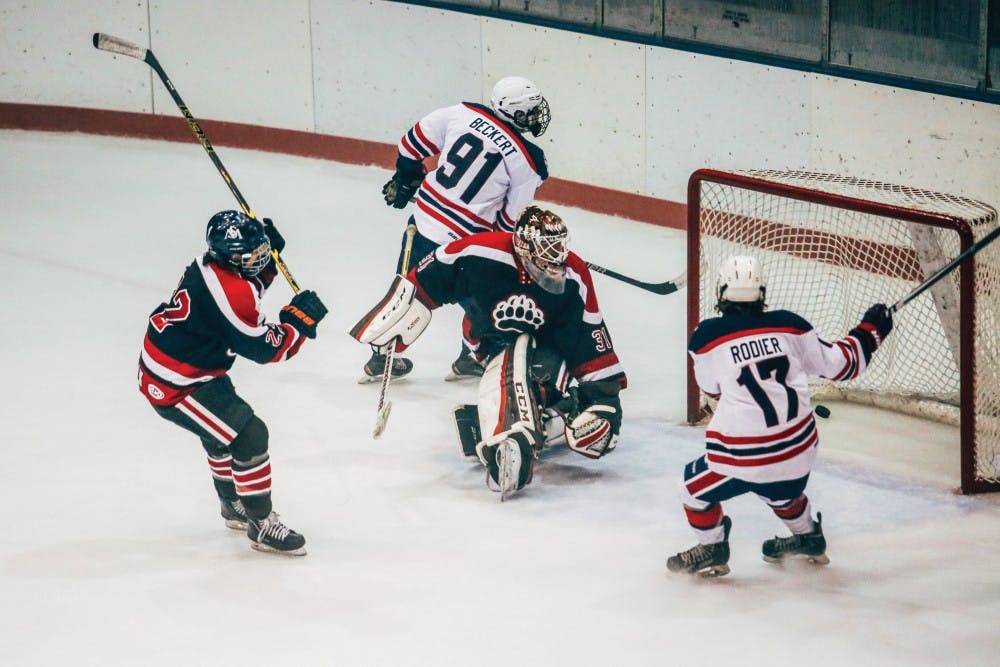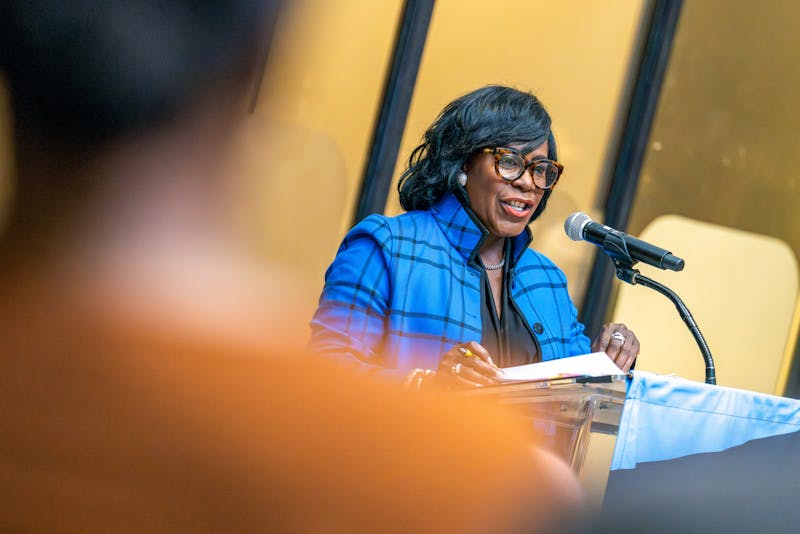
Freshmen Alex Beckert (18G, 15A) and Chris Rodier (16G, 20A) combine for a score in Penn’s 11-6 victory over Brown in the Ivy League Tournament.
Credit: Ilana WurmanPenn loves beating Princeton. That sentiment is as old as the Penn-Princeton rivalry itself.
Ask any Penn Athletics fan and they will likely tell you that a win against Princeton is a slight notch below an Ivy League championship. That sentiment extends beyond the school’s 30-plus varsity sports and will be the goal for Penn men’s ice hockey when they take on Princeton’s club program on Friday in the so-called MegaCup.
In a way, men’s ice hockey is a unique club to Penn since it was actually a varsity program from 1965-1978. The process of Penn ice hockey being decomissioned as a varsity program was anything but harmonious.
That year, then-Athletic Director Andy Geiger announced that ice hockey, gymnastics, golf and badminton would no longer be varsity sports. While the teams under fire were certainly not pleased, it was the Undergraduate Assembly that protested in droves.
The students organized a rally, which turned into a four-day sit-in. They convinced administration to find other cost cutting approaches that would save gymnastics, golf, and badminton. Unfortunately, hockey was left out of the mix and the school would hold its last varsity hockey game in March 1978.
Fast forward to 2016, where the club team is beginning to pick up steam with its latest run of play. The Quakers (10-4) are based in the American Collegiate Hockey Association (ACHA) D2 and currently sit third in the division behind TCNJ (10-5-1) and the dreaded Tigers (14-1-0).
For the club, this is a successful time after a string of unsuccessful seasons. In 2014-15, the Quakers stumbled to a dreary 4-18 record. They scored 3.6 goals per game while allowing 6.7.
In 2015-16, the team finished 9-10, well in the bottom half of the southeast division. That year, the team’s scoring picked up and the play of the defense improved substantially. The 4.9 goals per game they scored was about the conference’s average but the 4.5 goals per game they allowed was a marked improvement and one of the higher figures in the division.
This season, it’s a totally different story. Of the 48 teams in the ACHA D2 Southeastern conference, the Quakers are third in goals per game while their backstopping unit continues to improve. The team’s win percentage is also among the highest in the group.
The problem was not the senior class, according to senior forward Aaron Faison, but rather a new set of upperclassmen setting the tone. As the longest tenured member of the club, Faison played three of his four years with that group of seniors and has helped carry the torch this season with his fellow teammates.
“Those guys that left last year were the backbone of the team since when I first joined. They’re all really good players, good leaders,” Faison said. “There’s definitely been a lot of playing time opening up this year.”
“It’s been good for me, the other seniors and the juniors to set the tone. I think we’ve done a better job of discipline and setting expectations.”
The difference, according to senior forward and assistant captain Josh Nelson, is an intriguing mix of experience and youth.
“We had a huge freshmen class, a big internal recruiting effort, and some grad students as well,” Nelson said of this season. “We’ve been really successful this year.”
As Nelson mentioned, the players do most of the team’s recruiting. That is just one of many challenges of a club sport run entirely by students. Nelson is the program’s treasurer but also an assistant captain and forward for the team. The team’s president, Rolando Bonachea, is also one of the goalies. The team’s board are not only some of the major contributors on the ice but is also in charge of advertising, maintaining the website, and, perhaps most challenging of the bunch, finding new members.
On the topic of recruiting, it can be very challenging for Penn hockey to get in touch with potentially interested players. Many ACHA D1 programs invite accepted freshmen to an optional skate as part of the university’s accepted students days. Some programs even get in touch with high school students before they finally commit to a school. For Penn hockey, that’s not the current reality but the goal.
“We try to market as a good, fun experience,” senior forward and assistant captain Nick DeMarshall said.
One of the other major hurdles is promoting and advertising. Penn’s varsity programs have the advantages of Penn Athletics’ expansive Twitter page, the brand new website and far greater expenses. The team’s budget comes mostly from alumni contributions and the players’ own dues. Given the shortage of resources, it is understandable why the team has struggled with attendance.
As junior forward and captain Jay Tucker sees it, “Often, people don’t even know there’s a rink on campus, and people often don’t know there’s a team. I’d say 90% of my friends wouldn’t know there’s a hockey team on campus if I wasn’t on it.”
That is why Friday’s game is much more than a standard club hockey game. It’s much more than a game against Princeton. It could be a test of the club’s reach and an early step in the revival of the varsity hockey program.
The team has already started distributing flyers on Locust looking to draw in students. As Bonachea admits, it can be difficult to communicate a message when the majority of Penn students are unaware of Penn hockey’s club status.
As he sees it, there is a small minority in the know on Penn hockey, but a far superior majority that is either unaware of a hockey program or thinks that the club is actually one of the school’s 27 varsity teams. That said, Bonachea thinks a good showing on Friday could be a major step.
The Quakers, like in their varsity days, still play in the Class of 1923 Arena. Even though the capacity is about 2500, a rowdy crowd of a few hundred can create a roaring environment for the opponent.
“Basically relying on ourselves with some other groups’ help, if we are able to attract 500 people to the game, that would show we’re able to reach beyond our core constituencies of parents, families, and fraternity brothers,” Bonachea said, emphasizing the idea that the team is “operating voluntarily to promote the game” and is working without “an extensive institutional support in promotion.”
If the team can get a good showing and turn those one-time visitors into season-long fans, it would be a massive step. From the players’ perspective, the club is performing well in its conference. And, if it’s a good team and awareness is high, fans will come.
Of course, a good team and fan support will play important factors in the administration’s decision to reconsider hockey as a varsity sport. Beyond that, a major concern would be the financial aspect. On that front, Bonachea is hopeful that the team can acquire the necessary funding.
“We’ve been in communication with parts of the University and expressed to them our goals for the Penn hockey program and we’ve also started conversations with alumni looking to see if we have the financial support to bring back the program.”
This most recent push to join the varsity ranks extends beyond the team’s success. If the move does not happen soon, it is unlikely to happen again. In Penn’s vision for construction and development from now until 2030, the Class of 1923 Arena is not seen. The arena’s future plans are unclear, but one theory could be that the school knocks it down to continue its move eastward.
Another reason, and a more salient one, why this group is so adamant about bringing back the varsity team is because of a love for the game.
“It’s really the love of hockey and the game. I would love, in five or six years, to turn on NBC Sports Network and see Penn playing Penn State, with Penn competing on the top level of hockey,” Bonachea said. “I think it could help build a little bit of a community. Me, personally, I’d like to see the program succeed.”
There is a history to teams moving from the ACHA to NCAA. Penn State and Arizona State, for example, recently completed the transition even though both are considered non-traditional hockey markets.
On a light weekend for Penn Athletics – most fall programs have finished their season and Penn football will be in Cornell – Friday’s game will not only be a unique experience, but it could be an historic first step towards reviving the varsity hockey program.
The Daily Pennsylvanian is an independent, student-run newspaper. Please consider making a donation to support the coverage that shapes the University. Your generosity ensures a future of strong journalism at Penn.
Donate






